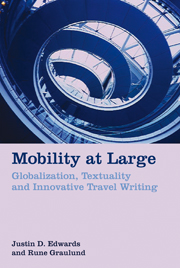Book contents
- Frontmatter
- Contents
- Acknowledgements
- Introduction: Travel Revisited
- 1 Travelling with the Ondaatje Bros.
- 2 Amitav Ghosh and Caryl Phillips: Global Travel, Then and Now
- 3 Unhomely Travels; or, the Haunts of Daphne Marlatt and W. G. Sebald
- 4 The World, My City: Home Grounds and Global Cities
- 5 Travel Histories – From Kuala Lumpur to Istanbul and Beyond
- Postscript: Still Mobile
- Bibliography
- Index
1 - Travelling with the Ondaatje Bros.
- Frontmatter
- Contents
- Acknowledgements
- Introduction: Travel Revisited
- 1 Travelling with the Ondaatje Bros.
- 2 Amitav Ghosh and Caryl Phillips: Global Travel, Then and Now
- 3 Unhomely Travels; or, the Haunts of Daphne Marlatt and W. G. Sebald
- 4 The World, My City: Home Grounds and Global Cities
- 5 Travel Histories – From Kuala Lumpur to Istanbul and Beyond
- Postscript: Still Mobile
- Bibliography
- Index
Summary
‘You must get this book right,’ my brother tells me, ‘You can only write it once.’ But the book is incomplete. In the end all your children move among the scattered acts and memories with no more clues.
Michael Ondaatje, Running in the Family 201The great achievement of my brother Michael's superb book Running in the Family was to re-create the world of the Ondaatjes […] And he got it right: the mood, the irresponsibility, the jazz, the frivolity, and the ultimate uselessness. Even when he exaggerated certain facts, he remained truthful to their spirit.
Christopher Ondaatje, The Man-Eater of Punanai 51In these quotations, two brothers – Michael and Christopher Ondaatje – locate one another in their respective travel narratives about Sri Lanka. The passage from Running in the Family (1982) foregrounds a dialogue about the success and failure of travel writing: Christopher's comment that the narrative needs to be told ‘right’ is followed by Michael's reply that the account can never be ‘complete’ and that the material will always be, in some sense, beyond representation. Conversely, in the passage from The Man-Eater of Punanai (1992), Christopher attempts to impose closure on the dialogue: he utters the last word by pronouncing that Michael ‘got it right’, even if he did stretch the truth through exaggeration. This intertextual exchange is, we suggest, synecdochic of the two writers' diverse approaches to contemporary travel writing. Michael looks for ‘clues’, whereas Christopher seeks out ‘facts’; Michael is content with ‘incompleteness’, whereas Christopher is only satisfied with the ‘truth’.
- Type
- Chapter
- Information
- Mobility at LargeGlobalization, Textuality and Innovative Travel Writing, pp. 21 - 48Publisher: Liverpool University PressPrint publication year: 2012

